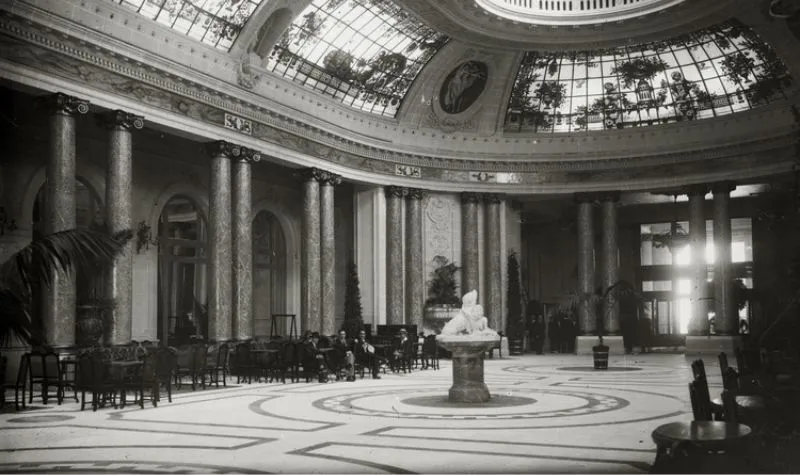It was 1921 when Donostia was about to inaugurate its new casino. A spectacular building that looks more like a palace than a place to play, but sparked an overwhelming curiosity in the city. Many locals had heard of the Las Vegas gambling market, although in Europe Casino Baden Baden in Germany or Casino Monte Carlo in France were already beginning to establish themselves.
In fact, some were also built in Belgium and the Netherlands “kursaales” which were nothing more than gambling casinos. Actually, the term “kursaal” was translated as “kurraum” because it was common in classic European spa houses to dedicate a building to the social life of the visitors.
The Kursaal included a representative hall and combined a ballroom, a theater, a concert hall, a restaurant and a games room. But the latter seemed to be the most popular of a typical Kursaal devoted to summer, entertainment and the separation of its people. And inspired by this spirit, San Sebastián chose the name Gran Kursaal Marítimo.
The Gran Kursaal was built, to put it simply, in front of Gros Beach and very close to the mouth of the Urumea River. With the sea in front of it, a bridge was built (Zurriola Bridge) which served as a link with the rest of the city and became an integral part of the images of the Basque Country of the time. No tourist wanted to leave the city without having been there at least once.
During the time the casino hosted a variety of cultural events, exhibitions and plays. Although it also acquired a link with politics, since acts of this nature were common. Speeches by King Alfonso XII or Francisco Franco rang out from under its walls, along with propaganda films.
However, the private management of the Gran Kursaal took its toll when the Franco dictatorship arrived. And it is that being banned from the game weighed on him for many years, leaving him with no choice but to adapt and try to pursue other activities that he wasn’t originally meant to do. A bit of what is happening to the physical casino today given the over intrusion of the online casino.
The end of 50 years of entertainment
Faced with the difficulties of surviving in the circumstances of the 1960s in Spain, the casino operating company had to make the difficult decision to demolish the building and try to use and optimize the remaining free land. The Großer Kursaal was one of the landmarks of the area at the time and for many residents it was painful to see it fall.
Despite this, the decline continued over time. The public tender for approval of a new replacement project was not easy. In 1965 the green light was given for a first attempt, which came to nothing due to its complexity, until the final project came in 1972 and the Kursaal was demolished in 1973.

All seemed poised for Donostia to see new construction on the edge of its coast, but again it was unsuccessful. The palace had been demolished in vain. The so-called “Solar K” stood empty for almost 20 years without anyone having a useful or useful idea for it. Luckily, architect Rafael Moneo hit the key in 1991.
A new auditorium would take the Kursaal’s name and promote a conference center Completed in 1999. There were obstacles along the way as this very modern construction would clash with the classic French style buildings of central San Sebastián. But the die was already cast.
Since then, the Kursaal has become the seat of the prestigious San Sebastian Film Festival and has the aforementioned auditorium, the chamber room, multipurpose rooms for meetings and congresses, exhibition rooms and the Kubo room managed by the Savings Bank Kutxa. .
The new Kursaal Casino
Is that how you say goodbye to Casino Kursaal? It is not so. And it is that in the Very Noble and Very Loyal the idea of seeing a playroom by that name again never gave up. And although it had to move more than half a kilometer to the west, crossing the river and holding on to the port, the Kursaal Casino was reborn as a betting house.
It is now owned by Luckia and has a facade more reminiscent of a subway or train station than an arcade. But when you go inside you will be able to find a very good selection of state of the art slot machines, American roulette tables, blackjack and different poker variants. They emphasize Texas Holdem and poker without discarding.
It also includes a sports betting section with a particular focus on horse racing, which the Basque government promotes along with other sister resorts from Paris, Lausanne or Monte Carlo. Screens and seats surround a module well prepared to enjoy all kinds of events of this nature.
Events that cannot be missed at the Kursaal Casino, with tributes to artists and live music, various gaming tournaments and promotions for those who belong to the Luckia Club. Vouchers for dining at the local restaurant are also included, where the menu is wide and varied, featuring recipes for Basque cuisine of the past and present. They even include dinner menus and a later tour of the roulette or blackjack tables.
A good catalog of options in an establishment that doesn’t even come close to eclipsing its ancestor, but which serves to continue to be remembered and remembered A hundred years later reminiscent of the Great Kursaal.

